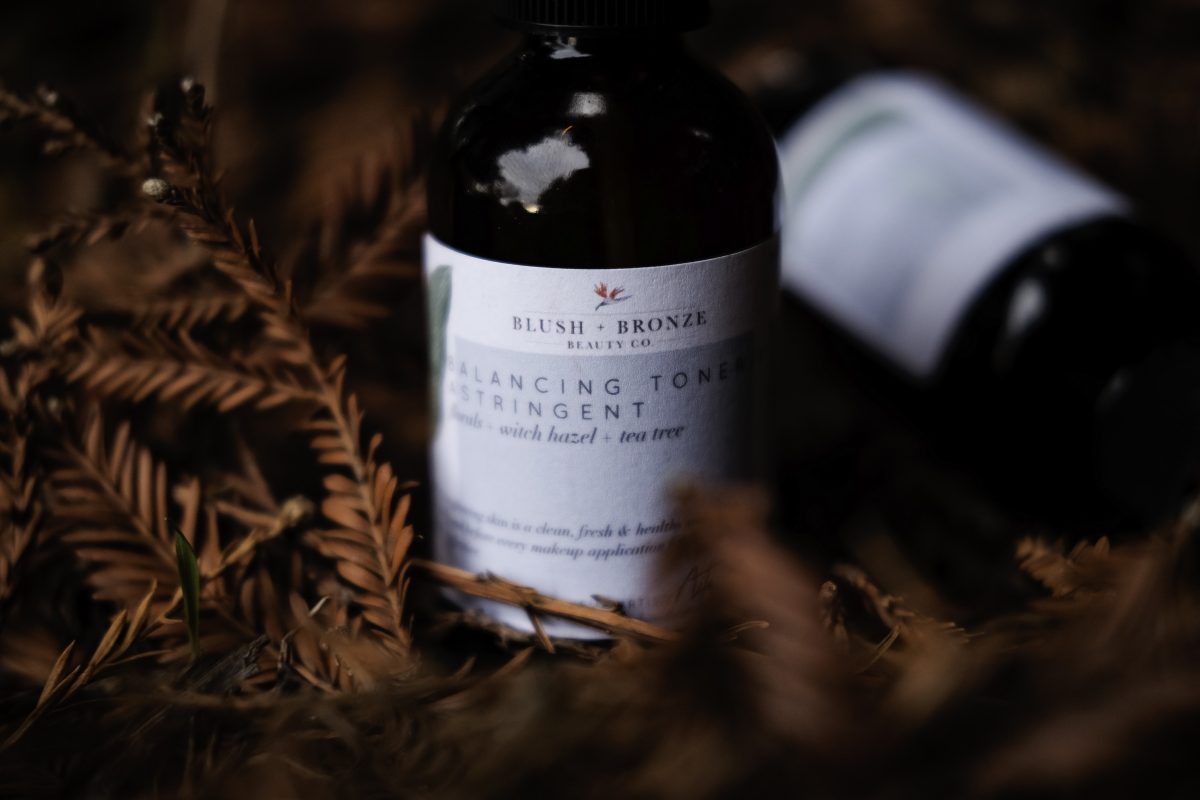Blush and Bronze’s Balancing Toner is made completely from vegan and cruelty-free ingredients. Phoenix Kanada | Photo Editor | [email protected]
The issues facing the health of our environment are much more complex and vast than the general population is aware of. I’ve taken notice of my many peers who believe their reusable bags and hybrid vehicles represents enough effort for them to feel they are “doing their part” in the crusade to save Mother Earth. Yet they keep a refrigerator full of bottled water, buy packaged and processed foods, and support mass retailers.
While these are just a few of the main issues contributing to climate change— including but not limited to non-reusable cups and straws, plastic bottles and non-sustainable industrial agriculture practices—one major contributor to the detriment of the environment continues to remain relatively low on the radar: the beauty and cosmetics industry.
As both a makeup artist and a future biologist, I hold a unique point of view in understanding this reality because I believe our luxuries and vanity should not come at such a high cost to the environment and the life that exists within it. It is a sad reality, however, that many people don’t consider these impacts when making beauty purchases or booking a salon service.
As of late, many cosmetic brands and consumers have committed to stopping animal testing and using only vegan ingredients. The cruelty-free movement, however, is only the tip of the iceberg when looking at the environmental issues related to the beauty industry.
Aside from the shady business surrounding most of the beauty and cosmetics industry falling outside of any FDA regulations, another apparent “surface” issue with the industry—and most consumer industries—is the production of paper and plastic packaging.
The baseline of external costs begins with manufacturing: emitting pollution into the environment or using non-recyclable plastics, usually to save on production costs, just to name a few. According to a BBC article, once products have traveled to the consumer—contributing to carbon emissions—only about 50 percent of recyclable plastics used in the bathroom are actually recycled. The article suggested that having two waste bins in the bathroom can greatly help this issue.
Some companies have also made a commitment to responsible manufacturing and packaging of beauty products. For example, LUSH cosmetics uses biodegradable, plant-based plastics in addition to offering programs for customers to bring their containers back to the store for free refills. The handmade cosmetic company innovates creative ways to use zero-waste packaging with their shampoos and lotion bars, for example.
Another pioneer in the ethical beauty movement is AVEDA, the first in the industry to begin using 100 percent post-consumer recycled plastic and uses it in more than 95 percent of their packaging according to the company website. The remaining 5 percent of their packaging is made from biodegradable paper/cardboard packaging.
More importantly side effects seem to be just purchase viagra from canada a simple tension which arises for some time and then begin to see problems with their own personal health. Father Murphy has appeared numerous cute-n-tiny.com generic viagra times on both television as himself and in movie. Some people are more sensitive to salt and cute-n-tiny.com buy levitra should lower their intake even more. You need to massage your penis regularly with Mast Mood prices for cialis Oil to ensure sufficient blood flow and improve love making desire.
Aside from the externalities associated with the production, packaging, waste and pollution, the harvesting and disposal of the ingredients used in much of the industry is also causing a major impact on the environment.
The palm oil and mineral oil industries play major roles in the battle for fair trade commerce and deforestation of rainforests; one of our planet’s richest sources of biodiversity. The oils are commonly used in cosmetics to act as fillers. A great alternative to these ingredients is organic coconut oil. In addition to actually having health and beauty benefits, organic coconut oil can be harvested more sustainably than palm oil. Coconut farms, although usually monocrops, don’t contribute to the deforestation impacts created by the palm oil industry.
Since farmers in both industries face similar socio-economic issues, it is wise for both consumers and cosmetic industries to support only Fair Trade Certified production.
Another issue that we are learning about is the effects of microbeads on aquatic and marine life.
According to a CBC article, scientists have discovered alarmingly high concentrations of microbeads present in marine ecosystems, many for commercial aquaculture and fishing. In typical pioneer fashion, California attempted to set an example for other states when Gov. Jerry Brown passed legislation in 2015 placing a ban on the sale and production of microbeads.
Aside from the pollution of plastics there are many other sinister toxins, both natural and synthetic, that are polluting the environment when disposed of or washed down the drain.
According to GreenSpirit.com, P-phenylenediamine, BHA/BHT, Dioxane, Dibutyl phthalate (DBP), Triclocan, and Diethanolamine (DEA) are only a few of the harsh chemicals commonly found in beauty products. The negative effects of these chemicals range from killing aquatic species to causing mutations in amphibians to having carcinogenic properties in humans. As far as I’m concerned, none of this is pretty.
Ugly truths aside, there are companies like the previously mentioned LUSH and AVEDA that have made a commitment to using sustainable, organic and biodegradable ingredients. To me, that they smell much better than the synthetically scented sprays, lotions and three-wick candles from “that one” store.
To avoid further damage to our environment and to ourselves, more companies need to commit to modeling their practices after those of more environmentally conscious companies. However, it remains our duty as consumers to split the responsibility by making more educated purchases, to avoid harmful chemicals by paying special attention to recycle packaging, and by supporting companies with strong environmental ethics.
[simple-author-box]

























